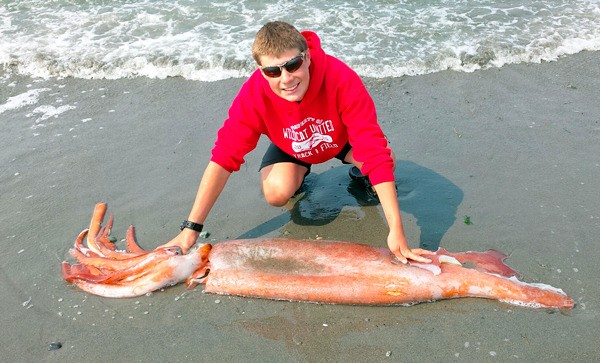The only thing certain in Peyton Horn’s mind was that whatever was on the end of his fishing line, it wasn’t a salmon.
None of the other options seemed very promising.
“I thought I just snagged some kelp or seaweed,” he said. “I brought the thing in and I was surprised. I had never seen one of those things in my life.”
Horn, an eighth grader from Oak Harbor Middle School, reeled in a giant squid while fishing for salmon on a North Whidbey beach Sunday morning.
The squid was dead, with missing parts and bites taken out of it. But it was an impressive sight nonetheless, estimated to be five-and-a-half feet long and so heavy Horn couldn’t lift it off the beach.
A biology professor who conducts research on marine life off Whidbey shores identified the massive creature as a robust clubhook squid, which is an unusual discovery in Puget Sound waters, and exceptionally rare around this island.
“I’m like 95 percent sure it’s a clubhook squid,” said Kirt L. Onthank, assistant professor of biology at Walla Walla University, noting a scant possibility of it being a Humboldt squid.
Onthank said he has spent recent summers in local waters doing research with students from the university’s Rosario Beach Marine Laboratory near Deception Pass.
Part of his doctoral research centered on Humboldt squids, so he’s well acquainted with that particular species.
He said he’s never seen a robust clubhook squid in person, but has studied many images.
Onthank said the features of the squid found by Horn on a beach near Ault Field at Whidbey Island Naval Air Station more closely resemble a robust clubhook squid.
By looking at the photograph of Horn and the squid, Onthank noticed characteristics that matched a clubhook, including a longer and more narrow body and longer arms.
When he zoomed in on the image, Orthank detected small, fleshy ridges down its mantle, another clubhook squid feature.
Onthank said the last documented clubhook squid on Whidbey appears to be 1997, when one washed up near the Camp Casey Conference Center in Coupeville.
When they show up in Puget Sound, it’s normally just a sighting of an individual once every year or so.
One squid about 8 feet in length, possibly a clubhook, was found at Richmond Beach north of Seattle in July.
“It has to be the right place at the right time,” Onthank said.
Finding a Humboldt squid in Puget Sound happens even less frequently, Onthank said.
But when they do show up, he said, it’s often in the hundreds or thousands.
A Humboldt squid hasn’t been found in the Salish Sea since 2009, he said.
Horn initially didn’t have any idea what sort of sea creature he reeled in.
He left the large squid on the beach, allowing nature to take its course.
Horn said his family suspected it was a Humboldt squid.
Horn was fishing for pink salmon with his mother, Melody Horn, when the Rotator lure he was using got caught on something on the seafloor. Initially dead weight, the squid became bouyant, making it easier for Horn to reel in using 20-pound test line.
“I thought it was a piece of kelp at first, but it got a little closer and I saw six arm things,” he said. “I then knew what I hooked. I was wondering if it was alive. But when I pulled it in, there were shark bites on it. It was missing its eyes.”
“The thing was torn up pretty badly.”
Living on an island where Pacific Giant octopuses are not uncommon for divers to spot in waters not far from shore, Horn didn’t know exactly what species of sea life he hooked.
But he knew it wasn’t a salmon.
“It was a little bit cooler than catching a salmon,” he said.



